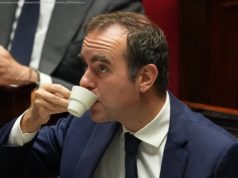A series of car bomb explosions rocked Syria’s capital Sunday, killing at least eight people and wounding 12, as officials claimed to have foiled a plot to target crowded areas during the first morning commute after a Muslim holiday.
By ALBERT AJI, Associated Press
DAMASCUS, Syria — A series of car bomb explosions rocked Syria’s capital Sunday, killing at least eight people and wounding 12, as officials claimed to have foiled a plot to target crowded areas during the first morning commute after a Muslim holiday.
The Interior Ministry said security forces tracked three cars loaded with explosives as they headed toward central Damascus. Two of the cars were intercepted at checkpoints on the airport road and detonated, apparently in controlled explosions, while the third made it into the city center, where the driver blew himself up near Tahreer Square.
The Syrian Minister of Local Administration, Hussein Makhlouf, said the response marked a « major success in foiling a plot » to cause mass casualties.
The attack came on the first full work day after the Eid al-Fitr holiday marking the end of the fasting month of Ramadan. State TV, which reported the toll, showed footage of two scorched vehicles on the airport road, as well as footage from Tahreer Square showing a damaged building and mangled cars at the small roundabout.
The Britain-based Syrian Observatory for Human Rights, an opposition monitoring group, put the death toll from the explosions at 12, including three attackers.
Such attacks have been relatively rare in Damascus, the seat of power for President Bashar Assad, who made a series of public appearances last week in a show of increased confidence after more than six years of battling a rebellion.
Pro-government forces have engaged in heavy fighting in Damascus’ suburbs during the war, but have largely kept the rebels out of the city center. In recent days, Syrian troops and allied forces have been fighting to drive the rebels out of Ain Terma and Jobar, adjacent areas on the city’s eastern outskirts that have been under rebel control since 2011.
The rebels said government forces attacked them with chlorine gas overnight, and the Britain-based Syrian Observatory for Human Rights, an opposition monitoring group, said 12 fighters were treated for suffocation. The Syrian military denied the claims, and there was no way to independently verify them.
The attacks come days before Russian-sponsored talks are to resume in the Kazakh capital, Astana, where the two sides agreed to a cease-fire earlier this year that has been repeatedly violated. The new round of talks is expected to delineate « de-escalation zones. » Russian officials said the talks are also to discuss the formation of a Syrian national reconciliation committee.
___________
Associated Press writers Sarah El Deeb and Zeina Karam in Beirut contributed to this report.






